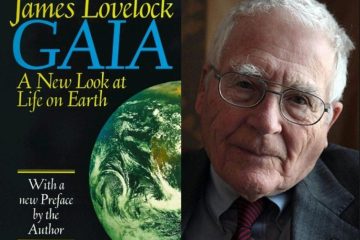Nestled within the realm of environmental science lies the intriguing work of James Lovelock, a pioneering figure in the field of ecology. His visionary ideas have sparked debates, reshaped paradigms, and challenged conventional thinking on our intricate relationship with the planet. Join us on a journey to uncover the profound insights and innovative concepts that Lovelock’s ecology has brought to the forefront of scientific discourse.
Table of Contents
- Exploring the Foundational Principles of James Lovelock’s Ecological Theory
- Unveiling Gaia Hypothesis: A Paradigm Shift in Ecological Understanding
- Analyzing Lovelock’s Views on Climate Change and Sustainability
- Implementing Lovelock’s Ecological Concepts for a Resilient Future
- Q&A
- In Summary

Exploring the Foundational Principles of James Lovelock’s Ecological Theory
James Lovelock’s ecological theory delves deep into the intricate web of connections that sustain life on Earth. At the core of his principles lies the notion of Gaia hypothesis, which posits that the Earth functions as a self-regulating organism.
<p>As we journey into the realms of Lovelock's ecological philosophy, we encounter the concept of <strong>holistic interconnectedness</strong>, highlighting the interdependence of all living organisms with their environment. This perspective challenges us to perceive the planet not as a mere collection of separate entities but as a unified system where every element plays a vital role in maintaining the delicate balance of life.</p>Unveiling Gaia Hypothesis: A Paradigm Shift in Ecological Understanding
Emerging from the visionary mind of James Lovelock, the Gaia Hypothesis embodies a revolutionary approach to viewing Earth not merely as a planet, but as a complex, self-regulating system. At its core lies the concept of Gaia, the Earth considered as a single living organism where all components interact to maintain conditions necessary for life.
This groundbreaking hypothesis challenges conventional ecological paradigms, inviting us to perceive Earth as a dynamic entity capable of adapting and evolving, much like a living being. By recognizing the interconnectedness of all life forms and abiotic factors on our planet, we are propelled to rethink our relationship with nature and embrace a more holistic understanding of sustainability.

Analyzing Lovelock’s Views on Climate Change and Sustainability
In his insightful works, Lovelock delves into the intricate relationship between climate change and sustainability, shedding light on the challenges and opportunities that lie ahead. By articulating the interconnectedness of ecosystems and human activities, Lovelock prompts us to rethink our approach to environmental stewardship.
<p>Through his lens, we uncover the fragility of our planet's systems and the urgency of embracing sustainable practices. Lovelock's provocative ideas push us to reimagine our role as custodians of the Earth, urging us to take action towards a more harmonious coexistence with nature.</p>
Implementing Lovelock’s Ecological Concepts for a Resilient Future
Exploring the essence of Lovelock’s ecological concepts unveils a world of interconnectedness and harmony that beckons us to reimagine our relationship with the environment. By embracing the Gaia hypothesis, we are beckoned to view the planet as a self-regulating organism, where each component, from the tiniest microorganism to the grandest ecosystem, plays a pivotal role in maintaining balance. This holistic perspective challenges us to tread lightly, honoring the delicate web of life that sustains us.
Adopting Lovelock’s vision entails acknowledging that our actions ripple through the intricate tapestry of nature, influencing ecosystems near and far. Embracing sustainable practices, fostering biodiversity, and cultivating resilience are not mere options but imperatives for forging a future that thrives. Through mindful stewardship and a deep-seated reverence for the Earth, we pave the way for a resilient tomorrow where humanity coexists harmoniously with all forms of life.
Q&A
Q: Who is James Lovelock and why is he important in the field of ecology?
A: James Lovelock is a renowned scientist, best known for proposing the Gaia hypothesis, which suggests that the Earth functions as a single, self-regulating system. His work has significantly influenced the way we understand the interconnections between living organisms and the environment.
Q: What are some key contributions of James Lovelock to the field of ecology?
A: James Lovelock’s groundbreaking contributions to ecology extend beyond the Gaia hypothesis. He developed the concept of biosphere 2, a closed ecological system designed to study the interactions between organisms and their environment, paving the way for innovative research in environmental science.
Q: How has James Lovelock’s work influenced our understanding of climate change?
A: James Lovelock’s holistic approach to ecology has shed light on the delicate balance that exists within the Earth’s systems. His research has highlighted the urgency of addressing climate change and the importance of embracing sustainable practices to preserve the health of our planet for future generations.
Q: What can we learn from James Lovelock’s ecological perspective?
A: James Lovelock’s ecological perspective serves as a reminder of the intricate relationships that sustain life on Earth. By recognizing the Earth as a complex, interconnected system, we are encouraged to take proactive measures to protect our environment and support the biodiversity essential for a thriving planet.
In Summary
In conclusion, delving into the realm of James Lovelock’s ecological theories unveils a profound perspective on the interconnectedness of our planet. His pioneering work challenges us to rethink our relationship with the Earth and embrace a more holistic approach to environmental stewardship. As we navigate the complexities of a rapidly changing world, embracing Lovelock’s ideas can perhaps guide us towards a more sustainable future where harmony between humankind and nature can thrive. By reflecting on Lovelock’s groundbreaking contributions, we are beckoned to not only appreciate the delicate balance of ecosystems but also to actively participate in their preservation. Let us heed the wisdom of Lovelock and embark on a journey towards a more symbiotic existence with our precious planet.



0 Comments